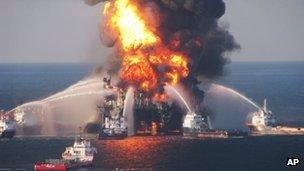BP: Scope of oil disaster internal probe 'had limitations'
- Published

The BP probe found that crew members missed an early warning that the rig was about to blow
A BP executive has admitted that an internal probe he led into the Gulf of Mexico oil disaster "had limitations'.
Mark Bly told a New Orleans court that the investigation did not consider the role of budgetary pressures from senior management in causing the accident.
A BP policy that investigations look at systematic failures by management was waived when the probe was initiated three days after the 2010 spill.
The trial will decide how much of the cost of the disaster BP must bear.
The civil lawsuit was brought against the UK oil firm - as well as other companies involved in the accident, including rig-owner Transocean and cement-provider Halliburton - by the US Justice of Department and the US states affected by the oil slick.
The plaintiffs claim that BP put profits before safety, and the oil leak happened because drilling was rushed due to pressure from management to cut costs.
A lawyer for the plaintiffs, Paul Sterbcow, noted in court that the Macondo project had already overrun by $60m and was a month behind schedule, with each additional day adding another $1m to costs.
"I don't recall it being part of our discussions," Mr Bly said, when asked about the cost overruns.
Missed early warning
The BP executive, who headed the company's safety and operational risk department, said that he and then-chief executive Tony Hayward decided to exclude a broader "systematic evaluation" from the scope of the investigation.
"We're tasked with getting the answer as quickly as we could, and trying to get to a position where we felt we could make good recommendations," he said.
"Having done that, we did have the option to try to go further, but at that point in time, given the limitation that we've touched on, it would have been very, very difficult to do that."
Mr Bly, who has since been promoted to BP's executive committee, said he planned to retire in the next two months.
The investigation did discover that BP's rig supervisors and crew members from Transocean had not carried out a crucial safety test properly, missing an important early warning that the pressure was too high and the well was about to rupture.
The Macondo explosion killed 11 men and released an estimated four million barrels of oil into the Gulf over 84 days.
The two BP site leaders at the well - Robert Kaluza and Donald Vidrine - have been indicted on manslaughter charges in the US for their alleged role in misinterpreting the test results.
The trial is intended to allocate blame and costs between the various companies involved, and to determine the degree of negligence involved - something that will determine the total amount of costs that must be paid.
If BP loses, it could face a huge fine, despite having already agreed in 2012 to pay $4.5bn (£2.9bn) to settle criminal charges.
An unfavourable trial verdict could see the firm liable for the biggest civil fine in history, of up to $17.6bn.
It has also paid out $7.8bn in a settlement with people and businesses affected.
- Published27 February 2013
- Published27 February 2013
- Published27 February 2013
- Published25 February 2013
- Published25 February 2013
- Published15 November 2012